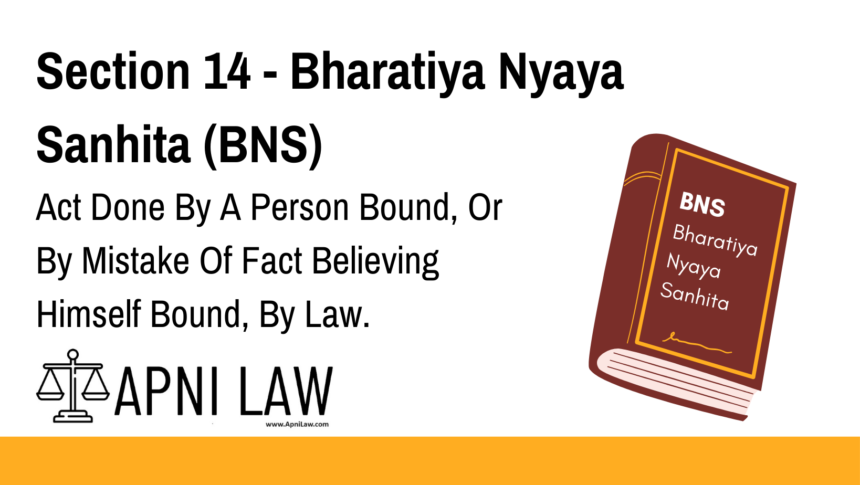Code: Section 14 BNS
Section 14
Nothing is an offence which is done by a person who is, or who by reason of a mistake of fact and not by reason of a mistake of law in good faith believes himself to be, bound by law to do it.
Illustrations
- (a) A, a soldier, fires on a mob by the order of his superior officer, in conformity with the commands of the law. A has committed no offence.
- (b) A, an officer of a Court, being ordered by that Court to arrest Y, and, after due enquiry, believing Z to be Y, arrests Z. A has committed no offence.
Explanation of Section 14 BNS
1. Meaning & Purpose
Section 14 of the Bharatiya Nyaya Sanhita (BNS), 2023, provides legal protection to individuals who act in good faith under a legal obligation. This means that if a person, due to a mistake of fact (not law), believes they are bound by law to act in a certain way, they will not be held criminally liable.
2. Key Elements of Section 14 BNS
- The person must act under legal obligation or believe in good faith that they are legally bound to act.
- The mistake must be of fact, not of law.
- The act must be done without malicious intent.
- If the above conditions are met, the person will not be punished for the act.
Illustration & Examples
Example 1: Obeying a Superior’s Order (Military Case)
A soldier receives a lawful order from his superior officer to fire on an attacking mob. Since the soldier is acting under a legal command, he cannot be punished under criminal law.
Example 2: Mistaken Identity in Law Enforcement
A court officer is instructed to arrest “Y”, but due to a mistake of fact, he arrests “Z” instead, genuinely believing Z to be Y. Since the mistake was not intentional and was made in good faith, the officer has committed no offence.
Example 3: Firefighter Breaking into a Property
A firefighter breaks down a locked door to save people during a fire. Although breaking into a property would normally be trespassing, it is not an offence because the firefighter is acting under legal duty.
Common Questions & Answers on Section 14 BNS
1. What does “Mistake of Fact” mean under Section 14?
A mistake of fact refers to a wrong understanding of reality, such as arresting the wrong person due to an honest belief.
2. What is the difference between “Mistake of Fact” and “Mistake of Law”?
- Mistake of Fact → Excused under Section 14 BNS (e.g., arresting the wrong person by accident).
- Mistake of Law → Not excused (e.g., claiming ignorance of a law as a defense).
3. Does this section apply to private individuals?
This section primarily applies to government officials, police officers, soldiers, and court officers who act under legal obligations.
4. Can Section 14 be used to justify illegal actions?
No, the act must be done in good faith and under a lawful duty. If a person misuses this section to justify illegal acts, they will be held accountable.
5. What happens if someone acts under an unlawful order?
If a person follows an illegal order, they may still be held responsible. Section 14 protects only those who act under lawful commands.
Conclusion
Section 14 BNS plays a crucial role in protecting individuals who act in good faith under a legal duty. It ensures that law enforcement officers, military personnel, and government officials are not wrongfully punished for performing their duties, provided they act without malicious intent.
For more legal explanations, visit ApniLaw today! 🚀











